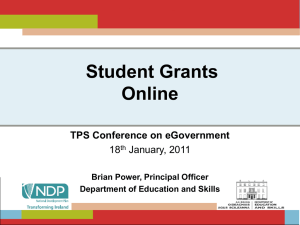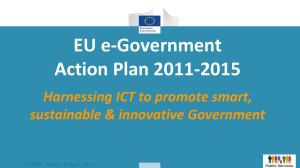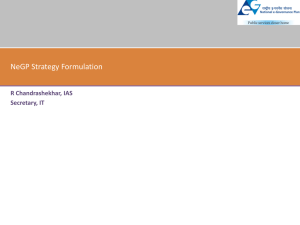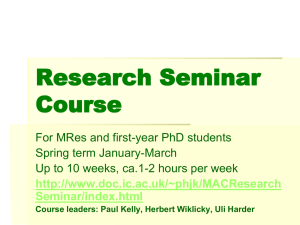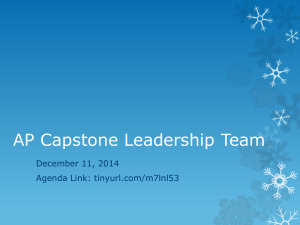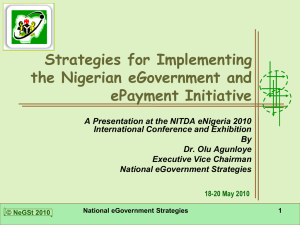Transforming Public Services Seminar
advertisement
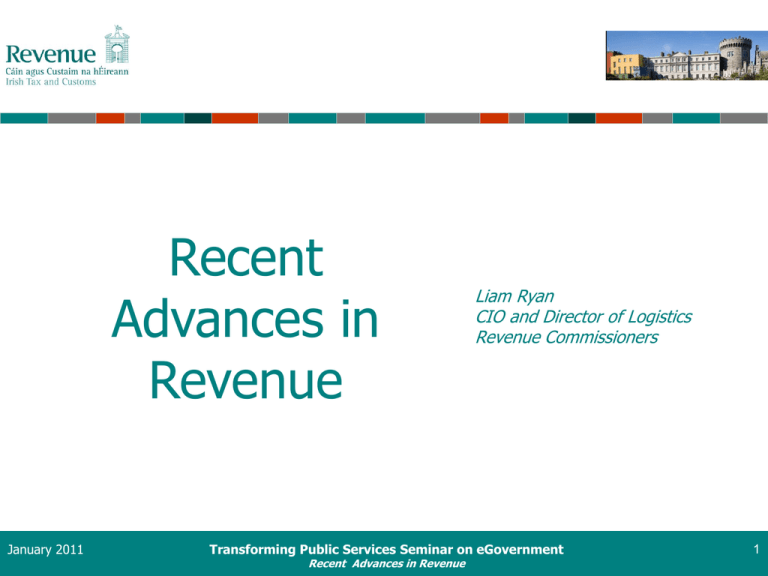
Recent Advances in Revenue January 2011 Liam Ryan CIO and Director of Logistics Revenue Commissioners Transforming Public Services Seminar on eGovernment Recent Advances in Revenue 1 Evolution andyeopportunities --“Challenges Doomed I tell ” of Strategy - -AStatement new cunning plan Legislation and examples - -Changing theprogramme rules Mandatory electronic filing - -Any colour as long as its black Joined-up - -We’re in thisworking together Radical change - -Now for something completely different Reworking ROS - -But I liked the old version Real-time - -Do not passrisk Goanalysis Customs & Excise and the EU - -The red channel Apps for - -iTuning in everything? RCT new - -Tablets anddirections tax Social media ambitions - -Learning to tweet Project control management - -Mission Services infrastructure - -Its good toand share Other developments - -Ask therecent audience Doingwe’re the right - -While herethings? Lessons we’ve learned - -The last word With subtitles! January 2011 Transforming Public Services Seminar on eGovernment Recent Advances in Revenue 2 Challenges and opportunities (“Doomed I tell ye”) The reality is that Government budgets will remain under pressure for years to come. Investments, for example in e-Government, must be pragmatic and prioritised. Technology will be a key factor is doing more with less, but the ‘spend to save’ argument must be used wisely. For the more optimistic, “Challenges and Opportunities” as per Revenue’s new Statement of Strategy January 2011 Customer self service, online, can help us cope and address our reduced resources. Transforming Public Services Seminar on eGovernment Recent Advances in Revenue 3 Statement of Strategy (A new cunning plan) New Revenue SoS focuses on: - Pressure on collection - Shadow economy - Smuggling - Compliance costs - Tax reform - International developments - Growth in online transactions - Loss of skills and experience - Flexibility and productivity - Value for money - Accountability for performance January 2011 …Targeting the highest risk areas, improving crossagency cooperation, information matching and intelligence usage… ….Increase the use of Revenue’s electronic channels, through better marketing of voluntary take-up and expanding mandatory categories…. Transforming Public Services Seminar on eGovernment Recent Advances in Revenue 4 Legislation programme (Changing the rules) This key enabling piece takes planning, fine crafting and time given the legislative life cycle. The changed rules then allow for changed business processes, which can in turn be incorporated into new ICT solutions. Revenue has recently engaged in big projects like: - Electronic Stamp Duty - Capital Taxes - Vehicle Registration all of which use specific enabling legislation for the move to electronic or online interaction. January 2011 Revenue also seeks to maintain the tax laws as befits an electronic era. For example we’ve recently consolidated the VAT tax laws. By updating and restructuring the VAT code in line with the EU VAT Directive, it has made VAT law more accessible and readable for tax practitioners, businesses, Revenue staff and students of taxation. Transforming Public Services Seminar on eGovernment Recent Advances in Revenue 5 Legislation programme examples (“I love it when a plan comes together”) Key aspects of eStamping and CAT Planned project timeline with respect to legislative cycle Early and wide consultation with stakeholders Obvious superiority of online system gives a built-in nudge Complex interactions on-line only (mandatory) - Finance Act 2008 - Regulation made and system launched in Dec 2009 - Online not yet mandatory - Voluntary electronic takeup 90% - Online easier/faster than paper Capital Acquisitions Tax Alternative and infrequent channels simplified as result Existing service/yield maintained during transition January 2011 Electronic Stamping - Finance Act 2010 - System launched in June 2010 - Complex reliefs mandatory online - Allowed simple paper version for occasional use - Online takeup already 45% Transforming Public Services Seminar on eGovernment Recent Advances in Revenue 6 Mandatory electronic filing (Any colour as long as its black) 1999 Legislation allowing for eFiling of tax returns and other Revenue forms introduced in Finance Act 1999 2003 Legislation allowing for mandatory eFiling and mandatory electronic payment and repayment of tax introduced in FA 2003 but subject to a commencement order 2008 20092010 January 2011 Commencement order made in 2008 following application by Revenue. There had been a certain reluctance in the "system" towards activating the measure. Revenue had to undertake to consult widely and commencement order only made after results of this consultation made known Mandatory eFiling already introduced for Governmental organisations (phase 1) and large companies and their subsidiaries (phase 2) A significant level of voluntary eFiling has been achieved by Revenue e.g. Income Tax 80%. No substantive legal issues so far as regards the use of a Digital Signature and elegislation in general Provision made to exclude those who do not have the capacity to file online. This is not defined in detail. Option to appeal any Revenue decision. Opportunity taken in reforming other tax administration to introduce mandatory eFiling especially for complex transactions Transforming Public Services Seminar on eGovernment Recent Advances in Revenue 7 Mandatory electronic filing (Completing the programme) 2011 Commence staged introduction of phase 3 of mandatory eFiling (extended to all companies, partnerships, trusts etc. approx. 200,000 entities) and do groundwork for next phase Significant consultation with and largely positive feedback from our customers and stakeholders is enabling our phased transition to mandatory electronic filing for most taxpayers. 2012 Commence staged introduction of phase 4 of mandatory eFiling (all remaining VAT, foreign life policies, offshore funds and certain reliefs and allowances) Further ‘mop up’ phases will mean that virtually all businesses and significant taxpayers will be required to file tax returns electronically by 2014 January 2011 Transforming Public Services Seminar on eGovernment Recent Advances in Revenue 8 Joined-up working (We’re in this together) Revenue Private Sector/ Representatives Other Government agencies Law Society, Tax Practitioners Capital Taxes Courts Service (Probate Office) Law Society, Tax Practitioners Stamps Duty Property Registration Authority Applus+, SIMI, Motor Dealers, Motor Distributors, Various Financial institutions January 2011 VRT Taxpayers Department of Transport, Department of Environment, RSA (NCTS), CSO, Gardai, EU Transforming Public Services Seminar on eGovernment Recent Advances in Revenue 9 Radical change (Now for something completely different) Revenue decided to use the National Car Testing Service to carry out pre registration checks formerly done by Revenue. Made necessary legal changes. Engaged with Road Safety Authority prior to their tendering for a new NCTS provider. Have linked the Revenue VRT system to the winning tenderer’s system (Applus+). January 2011 Transforming Public Services Seminar on eGovernment Recent Advances in Revenue 10 Reworking ROS (But I liked the old version) New Revenue channels such as PAYE anytime are designed with the Facebook generation in mind. Older offerings, such as the original ROS for business taxes are showing their age, from a usability and maintainability aspect. 2011 will see a significant revamp of the ROS channel, in tandem with scheduled functional releases Of course established customers are used to the old interface and we need to avoid disruptive change. January 2011 Transforming Public Services Seminar on eGovernment Recent Advances in Revenue 11 Real-time risk analysis (Do not pass Go) Prevent Detect Correct Punish Deter January 2011 Stop error and fraud getting into the system in the first place Increase the likelihood of finding bad transactions Put incorrect cases right quickly and get back what we’re owed Strengthen sanctions for those caught Publicise punishments and the likelihood of being caught Transforming Public Services Seminar on eGovernment Recent Advances in Revenue 12 Customs & Excise and the EU (The red channel) Excise movement control system (EMCS) - trade facilitation plus better control of excise movements Launch of Import and Export Control systems - Customs moving into the safety and security area EU Modernised Customs Code streamlining Community customs activities through use of technology Given our existing architecture and connections with other departments (e.g. Department of Agriculture) and the EU, our ROS system may be an option for the Irish ‘single window’ January 2011 Transforming Public Services Seminar on eGovernment Recent Advances in Revenue 13 Apps for everything? (iTuning in) We have launched the first of a series of applications (apps) for the iPhone and other mobile devices. iPAD and other tablets under consideration for more complex apps. Complemented by Rich Internet Applications for the desktop which combine tax calendar and pay and file functions for VAT and Payroll Taxes. January 2011 Transforming Public Services Seminar on eGovernment Recent Advances in Revenue 14 RCT new directions (Tablets and tax) As per the recent Budget announcement and subject to the Finance Bill process, the current Relevant Contracts Tax (Construction, Forestry, Meat) system will be upgraded to a largely electronic only system. Principal contractors will be obliged to engage with Revenue online at regular intervals. The key change is a real-time instruction either to pay a subcontractor gross or to stop tax at a specific rate. Revenue will also interact electronically with subcontractors. The new system will have three RCT rates, with the rate that is applied to a subcontractor dependent on the subcontractor’s compliance record. To underpin the implementation of these major changes, Revenue will engage with stakeholders early in 2011 and will be working with the CIF, IBEC, the SFA and other representative groups. January 2011 The nature of the industry and the envisaged electronic exchanges may lend themselves to the use of mobile tablet devices Transforming Public Services Seminar on eGovernment Recent Advances in Revenue 15 Social media ambitions (Learning to tweet) YouTube – for launches and ‘how to’ material, like Revenue Canada Twitter – as a rolling information channel (a la Irish Rail) LinkedIn – for closed user group discussions e.g. with tax practitioners Facebook - ??? Other - ??? January 2011 Transforming Public Services Seminar on eGovernment Recent Advances in Revenue 16 Project management (Mission control) Programme Planning Business/ICT Collaboration Benefits Grid Worksheet Programme: Assumption Outcomes Initiative or Outcome Initiatives Balancing Operational Support, Programme Delivery and Strategic Development Benefits Map Benefits Map Diagram Outputs = what is produced (products or deliverables). Measurement of Results Programme Budget Management Programme Management Outcomes are quite different from outputs. Outcomes = what is achieved - the effects and changes that result (in whole or in part) from the outputs. Risk Management Action taken. May be at the level of projects, key activities, or tasks (only break them out where they help achieve different outcomes or there's a risk that they might otherwise be overlooked). Post Implemention Review Abilities Operational Results Benefits … maintained / increased / decreased /eliminated / etc. Ability to … created / increased 1 7 2 3 4 … maintained / increased / decreased /eliminated / etc. 14 15 16 11 17 12 18 1 7 13 2 8 14 3 9 15 4 10 16 5 11 6 17 12 To ENABLE (deliver) the abilities What will be done Why: the benefits that will result 13 8 9 10 5 6 18 To EXPLOIT the abilities into results To HARVEST benefits from the results Notes Use this worksheet as a replacement for the Results Chain (RC) diagram in cases where the programme's logic is very straightforward and there are few if any 'multiple contributions'. If you prefer to use an RC, or this worksheet grows in complexity (in which case the RC is a much better means to capture the detail), use this as a means to gather raw material to develop the RC. Arrows indicate the broad flow of contribution (initiatives>outcomes or outcomes>outcomes). They don't indicate the order the worksheet should be completed in - that's completely down to you. Reference numbers (1 to 18 for both outcomees and initiatives) arre illustrative only. Add lines as required. Update numbering as content matures. Benefits Plan Outcome description Owner Measure Metric Metric data source Measurement frequency Baseline value Target date(s) Target value Who will own outcome achievement How success will be measured How much benefit will result When benefits will be felt Benefits Register Benefits Plan + Actuals How much benefit has been achieved Benefits Realisation Report Element of wider Post-Implementation Review January 2011 Transforming Public Services Seminar on eGovernment Recent Advances in Revenue 17 Services and infrastructure (Its good to share) eGovernment Strategy - Single view of customer service - Focus on intermediaries and professional bodies - Partial online+transaction slip to complete in person - On-line booking systems to manage queuing - Integrated directories and maps A secure infrastructure piece is still vital, whether internal, shared service, or external - and much more Data Centre Services January 2011 Transforming Public Services Seminar on eGovernment Recent Advances in Revenue 18 Other recent developments (While we’re here) Benefit MAC level down: - Key KPIs, - Drill down from departmental view to Division, Team - Shared data across agencies Build into new applications or can often be retrofitted cheaply Process redesign using business process modelling Monitoring workflows and KPIs via dashboards Data mining and predictive analytics January 2011 Adding maps to make information more accessible Using Open Source to make facilities affordable e.g. publishing management Collaboration and ‘ideas mining’ Transforming Public Services Seminar on eGovernment Recent Advances in Revenue 19 Doing the right things? (Ask the audience) “Ask the audience” is a common approach! Customer surveys (citizen and business) by Dept of Taoiseach Revenue also carries out its own customer surveys – see across http://www.revenue.ie/en/about/publications/other.html January 2011 Transforming Public Services Seminar on eGovernment Recent Advances in Revenue 20 Lessons we’ve learned (The last word) • eGovernment is a very powerful approach – it can genuinely transform how you do business and drive down costs • Review your legislation and business processes first! • Business managers must own projects, share responsibility for delivery with ICT and realise the benefits • Downstream change management needs constant emphasis to avoid becoming fragmented over time • Good governance and project management is vital • Need to get ICT capability / people strategies right • Advance quicker by learning from others; consider shared services and platforms if available • See your services through the eyes of the customer and seek feedback regularly • Take the long view in planning your programme, with incremental delivery January 2011 Transforming Public Services Seminar on eGovernment Recent Advances in Revenue 21 andye opportunities -- “Challenges Doomed I tell ” of Strategy -- AStatement new cunning plan Legislationthe programme and examples -- Changing rules Mandatory electronic -- Any colour as long as filing its black Joined-up working -- We’re in this together Radical -- Now for change something completely different Reworking ROSold version -- But I liked the Real-time risk -- Do not pass Goanalysis Customs & Excise and the EU -- The red channel Apps forineverything? -- iTuning RCT new directions -- Tablets and tax Social media ambitions -- Learning to tweet Project management -- Mission control Services andshare infrastructure -- Its good to Other developments -- Ask therecent audience Doing we’re the right -- While herethings? Lessons we’ve learned -- The last word January 2011 Thank you for your attention! lryan@revenue.ie Transforming Public Services Seminar on eGovernment Recent Advances in Revenue 22
